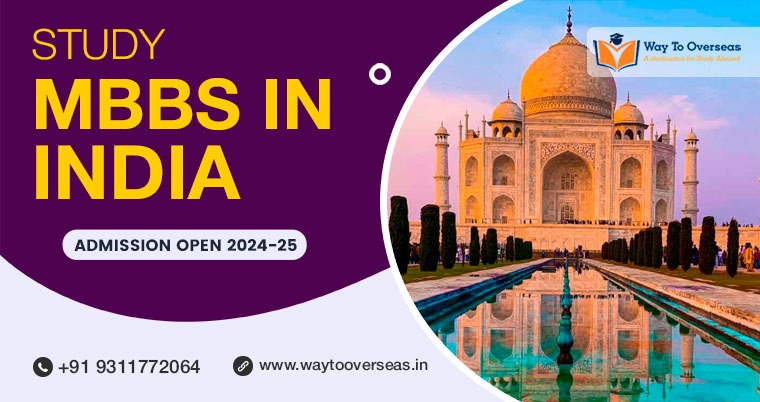MBBS In India
Study MBBS in India for Indian Students 2024-25

MBBS in India is among the most preferred medical courses in the world. The requirements for applying for MBBS course in India students must have cleared their 10+2 with Physics, Chemistry and Biology as primary subjects. Candidates must get a minimum aggregate score of 50-60% for entrance examinations. India’s MBBS course provides complete medical education in five and a half years plus one year internship. Age limit is another important factor. Most of the entrance exams require that you be at least 17 years old when you apply. To get admission to an MBBS course in India, one has to appear for competitive entrance examinations. The NEET is the most popular, compulsory exam for MBBS admissions in India.
MBBS in India 2024-25: Highlights
| Duration of the course | 4.5 Years |
| Basic Eligibility | 60% in PCB for General 40% for SC/ ST and Reserve Categories |
| Universities Recognition | NMC and WHO approved |
| NEET Exam Test | Yes, compulsory |
| IELTS and TOEFL | Not required |
| Medium of teaching | English, Hindi and Regional |
| Approx. tuition fees | 4,00,000 – 15,00,000 INR Per Year (Pvt. Colleges) |
| Top Medical Universities | All Government University |
Why MBBS in India?
- Medical Universities in India are some of the best and most prominent medical universities in the world.
- There are more than 300 medical universities and colleges in India, Out of these, approximately 180 are private colleges.
- In India there are approximately 72,098 seats.
- India’s MBBS is preferred for the quality of research and training programs.
- Indian medical colleges are renowned for providing best clinical skills and expertise.
- The international seminars and conferences are free of charge for students.
- After MBBS from India, the student can practise anywhere in the world.
- Students have the opportunity to practice on real human bodies.
MBBS in India - Eligibility for Indian Students
Every applicant aspiring to pursue MBBS in India must fulfill the minimum eligibility requirement specified during the admission procedure. There are some flexibility for the reserved category students in age, fee charges, etc.
Below are the eligibility criteria for MBBS admission in India:
- The students should have cleared 10+2 (Higher Secondary) or its equivalent from any government board.
- He/she must have passed Physics, Chemistry and Biology/Biotechnology with mandatory English as a subject in higher secondary school.
- The general category candidates should have qualified with at least 50% aggregate in PCB (Physics, Chemistry, Biology) subjects.
- To get admission candidates should clear the National Eligibility cum Entrance Test (NEET-UG) with the cutoff marks.
- Minimum age Must be 17 years as on or before December 31 of the admission year and Maximum age is 25 years for students of the general category.
- All male and female Indian citizens are eligible to apply for MBBS in India.
- Non-Resident Indians (NRI) and foreign students have to fulfill additional criteria or qualify through quotas.
What is the Major Difference in Doing MBBS in India and MBBS Abroad?
- The course duration: all the medical universities outside India offer a syllabus of 6 years including 5 years of theoretical and one year internship; for MBBS in India it is 5.5 years including 4.5 years of theory and 1 year of internship.
- Course Fee: Indian government colleges don’t have a huge fee structure when compare with Indian private medical colleges.
- The reputation: few Indian medical colleges appear in the list of the world’s top medical colleges, even AIIMS, Delhi, India’s top medical college is not included in the list of the top 100 medical colleges.In such a case, it is preferable to be associated with an overseas medical college instead of going to a private medical college.
- Personality development: living outside India will help you to be well-rounded personality as a result of the global exposure that you will gain, You will learn more and get familiar when you pursue MBBS abroad as compared to India.
- NMC Screening Test: if you want to come back to India after MBBS abroad, you need to appear for NMC Screening Test or FMGE to get a licence to practice medicine in India; you study from any medical college in India, and after graduation you get the license and you do not have to appear for any examination.
- The global exposure: During the time when you study medicine abroad, you meet a lot of different foreigners and also you get to know their culture, thus, giving you the global exposure for personal growth.
- Top class infrastructure: apart from few state medical colleges, the hospital in India has very poor infrastructure, and if you pursue MBBS abroad, you will enjoy a high-quality education that too in top class State of the art infrastructure medical universities.
- Global reputation: it is always recommended to go and study in Universities which are famous in the world, MBBS Abroad offers you some benefits to indulge on an international level of education.
- Family and Friends: If you choose to do MBBS in India, you would be residing in India, meeting your parents and friends on special days and will not miss Indian cuisines and the ambience of staying in India.
- The NEET exam: to study MBBS in India, you should have good marks and ranks to be admitted into the best medical college of the country and you should also appear for NEET exam.
